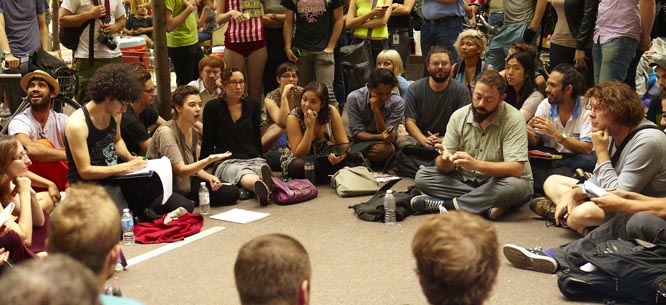Welcome to DU!
The truly grassroots left-of-center political community where regular people, not algorithms, drive the discussions and set the standards.
Join the community:
Create a free account
Support DU (and get rid of ads!):
Become a Star Member
Latest Breaking News
General Discussion
The DU Lounge
All Forums
Issue Forums
Culture Forums
Alliance Forums
Region Forums
Support Forums
Help & Search
General Discussion
Related: Editorials & Other Articles, Issue Forums, Alliance Forums, Region ForumsCheerleaders for Anarchism
from Dissent magazine:
Cheerleaders for Anarchism

[font size="1"]General assembly at Occupy Wall Street, 9/2011. Courtesy of Caroline Schiff Photography/Flickr.[/font]
By Nikil Saval - Summer 2013
Books discussed in this essay:
Two Cheers for Anarchism: Six Easy Pieces on Autonomy, Dignity, and Meaningful Work and Play
by James C. Scott
Princeton, 2012, 198 pp.
The Democracy Project: A History, a Crisis, a Movement
by David Graeber
Spiegel & Grau, 2013, 352 pp.
Everyday Revolutions: Horizontalism and Autonomy in Argentina
by Marina A. Sitrin
Zed Books, 2012, 224 pp.
The financial crisis of 2007–2008 inspired a shallow but significant revival of Marxist analysis in academic life. A violent upsurge in theory, however, has corresponded to no particular insurrection in practice. If any radical left tendency has been responsible for inspiring action, the palm should go to Marxism’s historic antagonist on the Left—anarchism. Wherever movements have been provoked against neoliberalism, black flags have tended to outnumber red. Autonomista and other kinds of left-libertarian thought were major currents running through movements in Greece and Spain. The cornerstone for the occupation of Zuccotti Park was laid by anarchists, who also developed the consensus procedures by which the movement participants made (or occasionally failed to make) decisions. Even where demands have seemed social democratic, many of the more creative and disruptive protests fueling them have been anarchist.
The ongoing confinement of Marxism to the academy is in some ways to be expected—it is, as David Graeber often quips, “the only great social movement that was invented by a Ph.D.” More surprising, however, is the relative absence of anything like a professedly anarchist viewpoint—whether anarchist social science or anarchist literary theory—in theoretical work. It’s not the case that anarchists, with classic bodies of work and debates on natural selection and evolution as a model for cooperation (Kropotkin), the nature of revolutionary action (Bakunin), or the origins of private property (Proudhon), have nothing to say about matters long the province of Marxists. Still, anarchism seems to be chiefly visible and successful in the world of activism, rather than in that of social thought. It’s as if (to cite a point also made by Graeber) Marxists and anarchists have submitted to a tacit division of labor: you handle the organizing, we’ll handle the theory.
But it appears as if the more recent anarchist movements are beginning to leave their mark, with a spate of books that attempt to consolidate what may be a kind of anarchist theory for the twenty-first century. Like Marxist analysis, which often seeks to unmask the real tendencies of history beneath the surface of the quotidian, anarchist theory, too, has an unmasking strategy: it sees fervent activity where one might be tempted to see stasis and homogeneity. What looks like consent is actually resistance; what looks like capitalism’s domination over everything actually conceals systems of mutual aid. Anarchist theory doesn’t just advocate anarchism; it rather reveals that, beneath everything, we’re more anarchist than we thought.
James C. Scott, a political scientist and anthropologist at Yale, has pursued anarchist themes, mostly in Southeast Asian history, for more than three decades. Though not an anarchist himself (he has described himself as a “crude Marxist, emphasis on the ‘crude’”), his analysis of protest movements is ecumenical in an anarchist way, acknowledging all kinds of disruption as “political.” And though he discusses inequalities of economic distribution, the focus of his disapprobation is usually unchecked exercise of state power, attempts by states at social engineering, something that distances him from more traditional socialists. In Scott’s hands, anarchism isn’t so much a socio-political doctrine as an anti-authoritarianism practiced, unselfconsciously, in everyday life—a means of insubordination running across societies everywhere. .......................(more)
The complete piece is at: http://www.dissentmagazine.org/article/cheerleaders-for-anarchism
InfoView thread info, including edit history
TrashPut this thread in your Trash Can (My DU » Trash Can)
BookmarkAdd this thread to your Bookmarks (My DU » Bookmarks)
0 replies, 687 views
ShareGet links to this post and/or share on social media
AlertAlert this post for a rule violation
PowersThere are no powers you can use on this post
EditCannot edit other people's posts
ReplyReply to this post
EditCannot edit other people's posts
Rec (0)
ReplyReply to this post